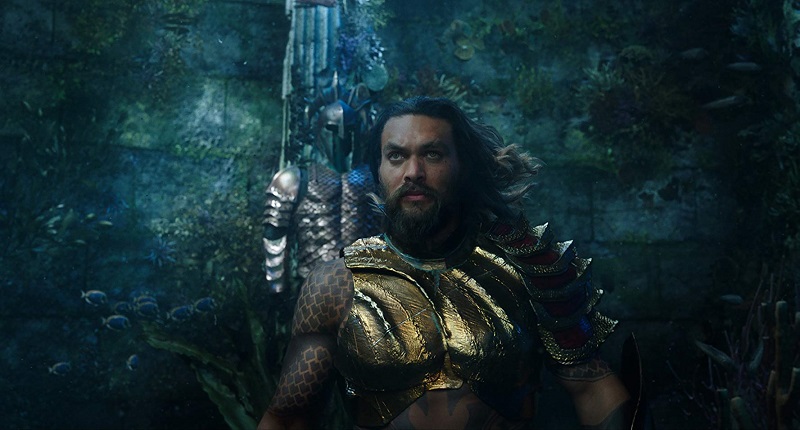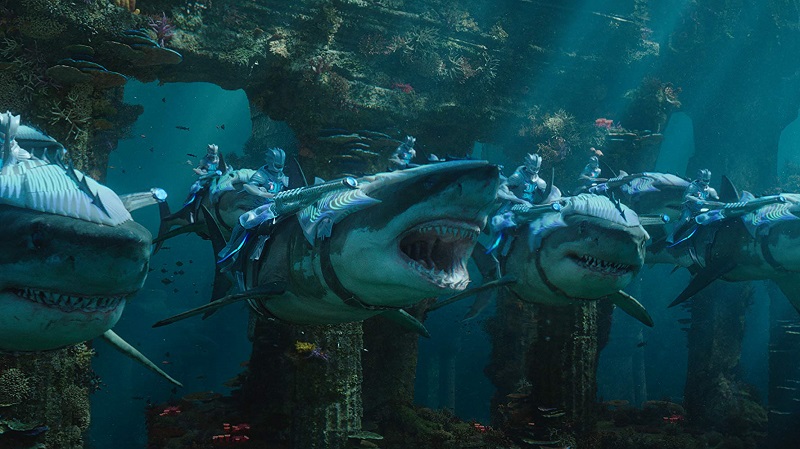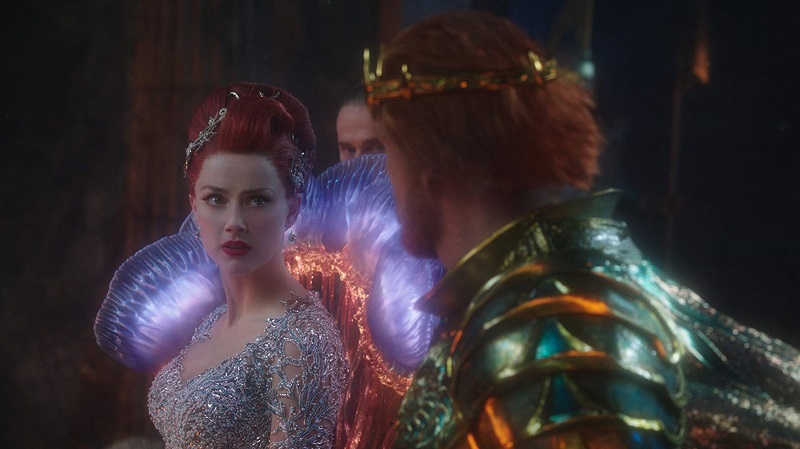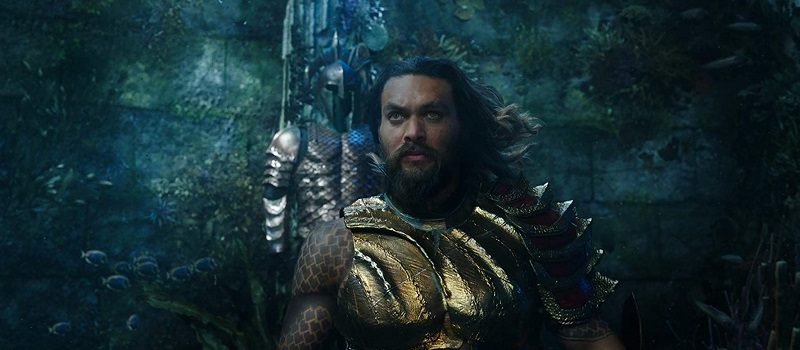Aquaman has been a long time coming. The DC Comics character has been endearing himself to fans for his aquatic valor since debuting in November of 1941. For decades now, a big screen leap for the water-based superhero has seemed like a pipe dream. For those of us who became aware of the character—thanks to the 70s animated Super Friends—the “fake” Entourage fictional film that found Vincent Chase starring and James Cameron directing was all we could cling to. For reals, that one scene they showed on the HBO hit looked top notch.

After cinematically debuting in Zack Snyder’s Justice League, Aquaman aficionados have been salivating with anticipation for director James Wan’s full-length origins story/solo venture for the man who was born to play the part—Jason Momoa.
There’s no pressure on Wan, Momoa or anyone associated with this endeavor, right?! Merely 77 years of expectations since the character first talked to the ocean creatures.
The first thing Aquaman has going for it is the man behind the camera. It could seem like the helmer that gave us Saw and The Conjuring would be an odd choice. But, look at what he did with Furious 7, employing an eclectic, electric and searing color palette that elevated that series beyond what it had visually done prior. Wan’s innate visual style meshes effortlessly with the underwater landscape that serves as the locale for much of the film. Sure, topside production design would be important too. After all, Arthur (his given name) is referred to as a “half-breed”—half human, half Atlantean.
Secondly, and most importantly, Momoa was born to be the title character. Not only does he have the look that triggers all the feels when you finally see him in that Aquaman costume. Momoa also has the panache, swagger and comes off as a child of the sea. After all, the actor’s father is a native Hawaiian. Just like Dwayne Johnson was perfect to voice/portray Maui in Moana due to his Pacific Islander heritage. That is important. Scratch that, that is imperative. Audiences demand it. Authenticity is key and that is one reason why audiences flocked to Moana and judging by initial numbers, they too will flock to see Momoa in Aquaman.
Even though we already “met” Aquaman in Justice League, there was no way the first solo film that “introduces” him to audiences would do so without doing the origins story thing. Right off the bat, Wan and his team of screenwriters (the filmmaker is also given a “story by” credit) get that all out of the way. His mom, Queen Atlanna (Nicole Kidman), escaped an arranged marriage in Atlantis and literally washed ashore at the foot of Tom Curry’s (Temuera Morrison) lighthouse. The two fell in love, welcomed baby Arthur (named for an incoming hurricane, but also because of its Arthurian connection).
Soon after the baby arrived, an armed force from Atlantis attacks their home and Atlanna knows what she needs to do—return home and leave Arthur with his father.
Willem Dafoe’s Vulko trains him on the down low as a child, then teenager, all with the promise that Arthur would return to take his rightful place on the throne. Instead, Aquaman (the moniker that he has taken when saving the day all over the planet), has more interest in serving the people who live above sea level. Mera (Amber Heard) appears and does everything she can to convince Arthur to return to Atlantis, but he won’t have it. It is when his half-brother King Orm (Patrick Wilson) starts attacking the humans that our hero realizes that maybe, just maybe, this is his calling after all.
Aquaman is bloated. It clocks in at two-hours and 22-minutes. Some of that length could have been saved by eliminating the origins aspect of Wan’s film. But, everyone responsible for putting together these movies all seem to think origins stories are just how you begin them. For example, Spider-Man: Homecoming was our umpteenth Spider-Man movie in recent memory and if there was anyone who didn’t need a new origins story, it was Peter Parker and his webbed wonder of a tale. Yet, we got one.
Filmmakers and producers of these super-hero movies should know that the audience is savvy and there doesn’t need to be so much attention paid to how our hero became a superhero. Aquaman would have packed more of a punch if that element of the story was merely glossed over. For those entering the theater with no idea how Aquaman became Aquaman, Arthur could explain that via some quick dialogue.

I think origins stories need to not be so meticulously tied to introducing us to characters that as a whole, I’d bet society knows more about how this hero became the guy (or girl) saving the day. See, in the case of Aquaman, that could have shaved at least 30 minutes from the film and a tighter/more compelling narrative would have benefited all those involved. It’s not that the experience was not enjoyable. Aquaman is immensely so—it’s just two-and-a-half-hour superhero movies need to stop being a thing. The entire genre would reap the benefits of it. Less running time equals more showings, i.e. box office profit.
A tighter Aquaman could easily have helped what ails Wan’s flick. The story is solid. We even have a subplot about a son of a man that Aquaman inadvertently killed who is coming after him. He somehow connects with King Orm and is another challenge facing the titular character. The part of the film that features Manta (Yahya Abdul-Mateen II), a legendary Aquaman villain, is muddied. One cannot help but think that if there was a little less origin and a little more meat added to the Manta storyline, the entire affair would have felt more dramatic, powerful and crisp. Instead, Manta is an afterthought and that is a shame because in the comics, the Manta-Aquaman battles are the stuff of legend.
Everyone involved does their absolute best to elevate the material, which is quite good—save those aforementioned origins ills. Momoa is a sensation. I’ve adored his work for years and it is such a delight to witness this great guy score a big budget actioner that befits his supreme talent. He possesses a screen presence that is seismic and so fitting of the character Aquaman. Wilson is a solid foil for Momoa and the two have an impeccable bombastic, brotherly tension that only works because of the supreme talents of both men. Dafoe, as always, is terrific and it’s great to see him back in the superhero milieu after his turn as the Green Goblin in Spider-Man. Kidman has a blast and keenly knows what is required of her, even though this whole superhero thing is new to her.

The lone stand-out, in terms of (mis)casting, is Heard. Her Mera is flat. The character never fully feels as flushed out and commanding as the rest of the cast. In my opinion, the actress has always been on the two-dimensional side when it comes to taking character arcs and bringing them to life. If there is a character that goes through a rich journey beyond our lead, it is Mera. Sadly, another actress would have breathed more life into the soul whose role is enormous when it comes to her spoke in the wheel that is the epic Aquaman.
It is probably a safe bet that the film will do bonkers business and an Aquaman 2 will be coming our way sooner than later. Although, with Henry Cavill leaving Superman and Ben Affleck’s turn as Batman up in the air, who knows what DC and Warner Bros. will do with its Justice League members heading forward. If there is anyone in the DC cinematic universe that deserves to be supported, it’s Momoa and his Aquaman. If they “reboot” Batman or Superman, I beg of the comic book studio that is constantly battling Marvel for supremacy, to leave what they have in Aquaman alone. Besides Wonder Woman, it is the character that they have truly hit it out of the park.
It’s fantastic that the two most diverse souls in the Justice League world are the ones that they got right. Aquaman is not nearly as astounding as Wonder Woman, but it is most certainly in the same League.
Grade: B

